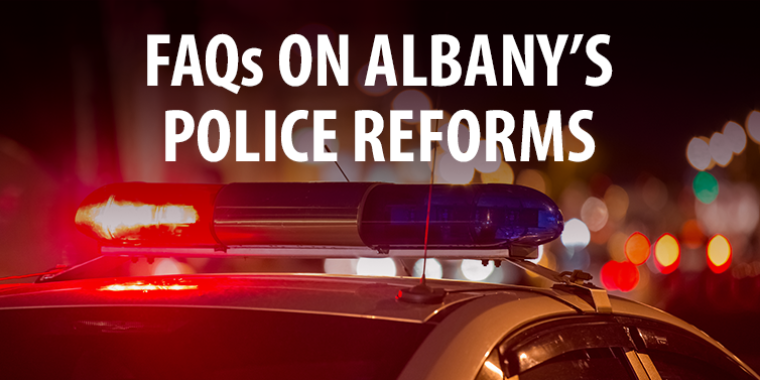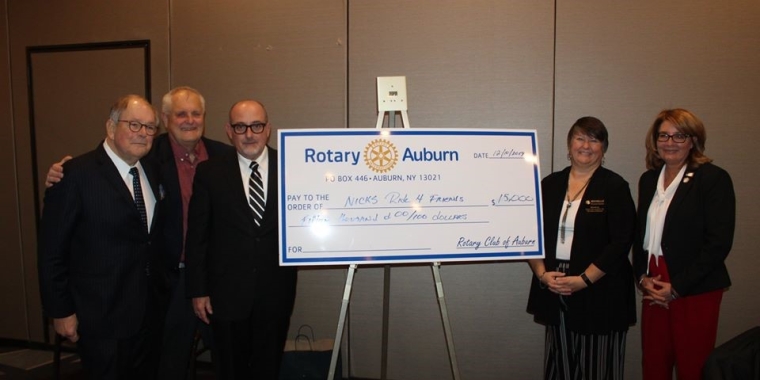
FAQs On Recently Passed Criminal Justice Legislation
June 24, 2020

Recently, the Governor signed into law several bills touted as police reforms. This includes the repeal of the historic New York State Civil Rights Law, Section 50-a. Many constituents have reached out to me about these new laws. Based upon these inquiries and various media reports, I thought it would be helpful to put together a Frequently Asked Questions page focused on the two most asked about laws; “50-a” and the “Police Statistics and Transparency Act”.
Q: What is 50-a?
A: Section 50-a of the Civil Rights Law was passed nearly 40 years ago to balance the rights of the police, peace and corrections officers, firefighters and parole and probation officers with the public’s right to access information. Despite reports to the contrary, under 50-a, the personnel records of these occupations are accessible in one of two ways. First, a person can give written consent for the release of information or a judge can order the release of this information if it is determined there is a legitimate need and the records are relevant. To be clear, 50-a expressly permits the release of relevant and material police discipline records for use in a criminal trial.
Q: What does the “50-a” repeal (S.8496) do then?
A: Through this repeal, the process for access to first responder personnel records that has provided transparency and balance for over 40 years is eliminated.
This legislation allows anyone to access a first responder’s personnel file for any reason by way of a simple Freedom of Information Law (FOIL) request.
It is important to note this goes far beyond the release of substantiated claims. Under this legislation, information related to unfounded claims (those that have been investigated and found to be false) and unsubstantiated claims (those that have been investigated and found to be inconclusive) must also be released. Claims that are under investigation must also be released.
Q: How does the release of disciplinary information for law enforcement, firefighters and others covered by this legislation compare to other professions?
A: According to testimony provided to the NYS Senate Committee on Codes, dated October 24, 2019, police, peace and corrections officers, firefighters and parole and probation officers have far less protections than many other licensed-professionals, public employees, and elected officials. For instance, the NYS Education Department investigates misconduct allegations of licensed professions. Unsubstantiated claims that do not result in disciplinary action are kept confidential. When a teacher is acquitted of misconduct claims, the charges are expunged from the employment record in order to avoid unsubstantiated charges from being used unfairly against a tenured teacher.
Under Public Health Law, administrative warnings and consultations regarding licensed physicians are confidential and reports to the Office of Professional Misconduct “shall remain confidential”.
Q: Will the repeal of 50- a bring about more transparency to help identify so-called ‘dangerous officers’ ?
A: No. 50-A already allows for substantiated (fact based) claims of police misconduct to be made readily available.
Q: What is the “Police Statistics and Transparency Act” (S.1830)?
A: The “Police Statistics and Transparency Act” is a separate, stand alone law. (Posts on social media suggest this law is sometimes confused with 50-a). The Police Statistics and Transparency Act will require the Courts to compile and publish detailed data on all low-level offenses, including misdemeanors and violations. Local law enforcement departments will be responsible for collecting this data and passing the information to the courts. This new law also requires police departments to report any arrest-related death.
It is important to note, departments are already required to report any death related arrests. The additional reporting requirements for misdemeanors and violations will drain law enforcement resources from community protection and shift those resources to paperwork related to non-felonies.
There is also no cost estimate and no state funding provided with it. This is a major unfunded mandate on towns, villages, cities, and counties.
This mandate will result in more staff time spent on paperwork and less on resolving cases and preventing crime.
Share this Article or Press Release
Newsroom
Go to NewsroomSenator Helming Participates in Wreaths Across America
December 16, 2019


Senator Helming Attends Lyons National Bank Groundbreaking in Farmington
December 11, 2019

